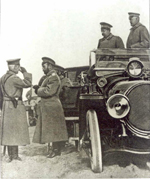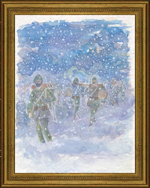General Information
Having seen the plans of both sides, now let’s briefly look at the daily course of the operation;
29 October 1914. The day before a religious feast (Kurban Bayrami) in Erzurum. There is a great joy in the 3rd Army. Preparations are being made for the next day. Soldiers are happy.
But, suddenly a great anxiety replaces the joy; the following news spreads from all telegram offices:
"Ottoman - German Navy engaged the Russian Navy off the Black Sea coast of the strait. One Russian Boat and one torpedo ship sank. No Ottoman casualty."
Then new Ottoman Ships, Yavuz and Midilli (Goben and Breslav), bombarded Sevastopol of Russia.
Soon after this, Hasan Izzet Pasha, the Commander of the 3rd Army gives an alert immediately. The religious feast is left half-finished. Officers join their respective units. Orders are received from Istanbul to act prudently. So, a great and yet terrible adventure starts.

Sketch: 1st Köprüköy Battle
01 November 1914. Russian units cross the Turkish Border and reach Köprüköy. Hasan İzzet Pasha decides to defend in the Erzurum Region. But, high command orders to attack immediately. There is a contradiction in between. However, order is order. The idea of İzzet Pasha to spend the winter assuming a defensive posture and attack in the summer is laid aside and an attack is launched. The Russian Army resists on the Köprüköy line. It is these battles that are called "1st Köprüköy battle" in history. Actually it was a stalemate.
Once again, a decision is made to launch an attack. Although a final victory is still far away, they prove superior to the Russians from time to time, so that the Russian Soldiers start to retreat for a moment thinking that they are losing. That moment is the first opportunity missed to destroy the Czar’s Army because the Turks also think the same way.
This operation, known as the 2nd Köprüköy battle in history, is considered a victory by Enver Pasha in the full sense of the word. Medals and letters of appreciation are awarded but the cold weather makes itself felt and soldiers begin to freeze.

Photo: Czar II. Nikolai inspects the front

Sketch: 2st Köprüköy Battle
But, Enver Pasha orders an attack. Hasan İzzet Pasha, with the help of Fevzi Pasha, asserts that it will be better to wait till winter is over and the Russians can be defeated by an attack to be launched in the summer.
Thereupon, the Deputy Commander in Chief Enver ambitiously comes to Erzurum and takes over the command immediately. He even says to İzzet Pasha, who was once his teacher while he was at the academy; ‘‘if you were not my instructor, I would let you be executed for this.’’ on the other hand, Ahmet Fevzi Pasha, who shared the same idea with İzzet Pasha, retired immediately. While he was on his way back, he came across a Turkish Unit near Ilica, which was deploying to the front. The officers seeing their commander on his way back surrounded him and asked how he was. Fevzi Pasha, with tears in his eyes, expressed his sorrow to the officers who were going to war by saying "come on, men to war, women to their homes."
In the mean time, Ziya Pasha the Commander of the 10th Corps was also retired and Colonel Hafiz Hakki, a friend of Enver Pasha, was assigned as the commander of the 10th Corps. Without paying attention to the rank and seniority, Enver Pasha, in the name of ‘‘rejuvenation’’, appointed the persons with whom he was acquainted to each command level, by separating the highly experienced commanders from the Army either by retirement or by resignation.
Now let’s return to the theatre not to deviate further from our main subject.
In accordance with the plan I explained, the operation started on 19 December 1914 when cold weather was very terrifying. There wasn’t any significant development until 22 December 1914. There were no major Russian Units around yet with the exception of some small resistance groups.

Painting : Marching in the Snow
|